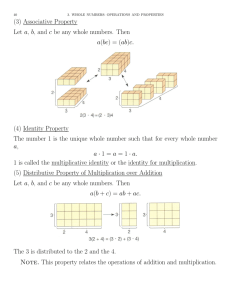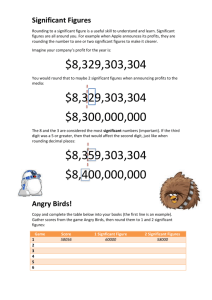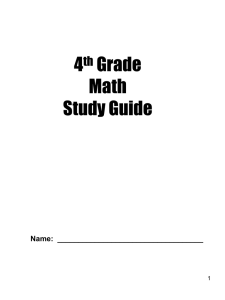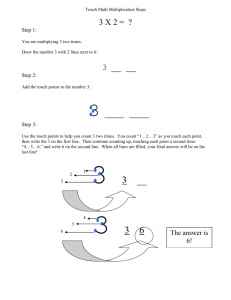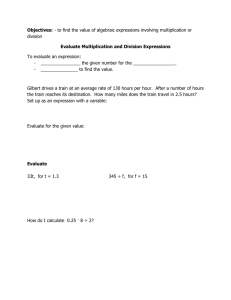Rounding Errors in Complex Floating-Point
advertisement
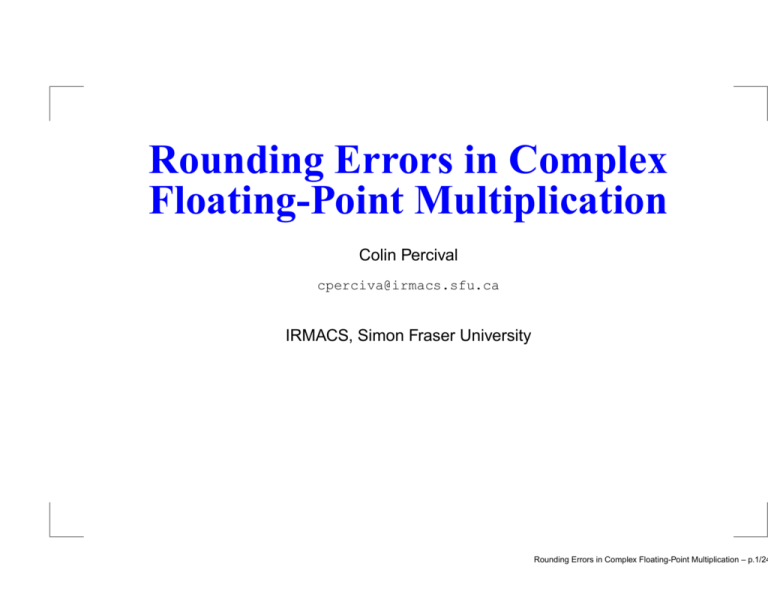
Rounding Errors in Complex
Floating-Point Multiplication
Colin Percival
cperciva@irmacs.sfu.ca
IRMACS, Simon Fraser University
Rounding Errors in Complex Floating-Point Multiplication – p.1/24
Review of Floating-Point Arithmetic
Floating-point values are expressed as a sign,
significand, and exponent, e.g.,
(−1)s · β e−B · m
where {s, e, m} ⊂ N, 0 < e < E , β t−1 ≤ m < β t , and
β, t, B, E are parameters of the floating-point system
being used.
Rounding Errors in Complex Floating-Point Multiplication – p.2/24
Review of Floating-Point Arithmetic
Floating-point values are expressed as a sign,
significand, and exponent, e.g.,
(−1)s · β e−B · m
where {s, e, m} ⊂ N, 0 < e < E , β t−1 ≤ m < β t , and
β, t, B, E are parameters of the floating-point system
being used.
As a special case, e = 0 and m = β t−1 represents ±0.
Rounding Errors in Complex Floating-Point Multiplication – p.2/24
Review of Floating-Point Arithmetic
Floating-point values are expressed as a sign,
significand, and exponent, e.g.,
(−1)s · β e−B · m
where {s, e, m} ⊂ N, 0 < e < E , β t−1 ≤ m < β t , and
β, t, B, E are parameters of the floating-point system
being used.
As a special case, e = 0 and m = β t−1 represents ±0.
In IEEE 754 “double precision” arithmetic, β = 2, t = 53,
B = 1075 and E = 2047.
Rounding Errors in Complex Floating-Point Multiplication – p.2/24
Review of Floating-Point Arithmetic
Floating-point values are expressed as a sign,
significand, and exponent, e.g.,
(−1)s · β e−B · m
where {s, e, m} ⊂ N, 0 < e < E , β t−1 ≤ m < β t , and
β, t, B, E are parameters of the floating-point system
being used.
As a special case, e = 0 and m = β t−1 represents ±0.
In IEEE 754 “double precision” arithmetic, β = 2, t = 53,
B = 1075 and E = 2047.
There are also denormals, infinities, and NaNs, but in
numerical code they usually never occur.
Rounding Errors in Complex Floating-Point Multiplication – p.2/24
Terminology
Denote by ⊕, , and ⊗ the results of rounded
floating-point addition, subtraction, and multiplication,
and define the “unit in the last place” ulp(x) for x 6= 0 as
the (unique) power of β such that
β t−1 ≤ |x| /ulp(x) < β t
and ulp(0) = 0.
Rounding Errors in Complex Floating-Point Multiplication – p.3/24
Terminology
Denote by ⊕, , and ⊗ the results of rounded
floating-point addition, subtraction, and multiplication,
and define the “unit in the last place” ulp(x) for x 6= 0 as
the (unique) power of β such that
β t−1 ≤ |x| /ulp(x) < β t
and ulp(0) = 0.
Note that for x 6= 0,
ulp((−1)s · β e−B · m) = β e−B
and ulp(x) ≤ x · β 1−t .
Rounding Errors in Complex Floating-Point Multiplication – p.3/24
Terminology
Denote by ⊕, , and ⊗ the results of rounded
floating-point addition, subtraction, and multiplication,
and define the “unit in the last place” ulp(x) for x 6= 0 as
the (unique) power of β such that
β t−1 ≤ |x| /ulp(x) < β t
and ulp(0) = 0.
Note that for x 6= 0,
ulp((−1)s · β e−B · m) = β e−B
and ulp(x) ≤ x · β 1−t .
Also define = 12 ulp(1) = 12 β 1−t .
Rounding Errors in Complex Floating-Point Multiplication – p.3/24
Floating-Point Rounding Errors
IEEE 754 requires that arithmetic operations produce
results which are exactly rounded, i.e., the same as if
the values were computed to infinite precision prior to
rounding.
Rounding Errors in Complex Floating-Point Multiplication – p.4/24
Floating-Point Rounding Errors
IEEE 754 requires that arithmetic operations produce
results which are exactly rounded, i.e., the same as if
the values were computed to infinite precision prior to
rounding.
In round-to-nearest mode on IEEE 754 systems,
1
|(x + y) − (x ⊕ y)| ≤ ulp(x + y) < (x + y)
2
1
|(x − y) − (x y)| ≤ ulp(x − y) < (x − y)
2
1
|(xy) − (x ⊗ y)| ≤ ulp(xy) < (xy)
2
Rounding Errors in Complex Floating-Point Multiplication – p.4/24
Floating-Point Rounding Errors
IEEE 754 requires that arithmetic operations produce
results which are exactly rounded, i.e., the same as if
the values were computed to infinite precision prior to
rounding.
In round-to-nearest mode on IEEE 754 systems,
1
|(x + y) − (x ⊕ y)| ≤ ulp(x + y) < (x + y)
2
1
|(x − y) − (x y)| ≤ ulp(x − y) < (x − y)
2
1
|(xy) − (x ⊗ y)| ≤ ulp(xy) < (xy)
2
Rounding Errors in Complex Floating-Point Multiplication – p.4/24
Complex Rounding Errors
For complex z0 = a0 + ib0 , z1 = a1 + ib1 , if we compute
z2 = a2 + ib2 = (a0 ⊕ a1 ) + i(b0 ⊕ b1 ), then
q
|(z0 + z1 ) − z2 | = ((a0 + a1 ) − a2 )2 + ((b0 + b1 ) − b2 )2
q
< ( |a0 + a1 |)2 + ( |b0 + b1 |)2 = |z0 + z1 |
Rounding Errors in Complex Floating-Point Multiplication – p.5/24
Complex Rounding Errors
For complex z0 = a0 + ib0 , z1 = a1 + ib1 , if we compute
z2 = a2 + ib2 = (a0 ⊕ a1 ) + i(b0 ⊕ b1 ), then
q
|(z0 + z1 ) − z2 | = ((a0 + a1 ) − a2 )2 + ((b0 + b1 ) − b2 )2
q
< ( |a0 + a1 |)2 + ( |b0 + b1 |)2 = |z0 + z1 |
Problem: If we compute
x2 = (a0 ⊗ a1 ) (b0 ⊗ b1 )
y2 = (a0 ⊗ b1 ) ⊕ (b0 ⊗ a1 ),
what is the smallest α such that |z0 z1 − z2 | < α |z0 z1 | ?
Rounding Errors in Complex Floating-Point Multiplication – p.5/24
Motivation
The Fast Fourier Transform makes large polynomial
(and integer) arithmetic practical.
Rounding Errors in Complex Floating-Point Multiplication – p.6/24
Motivation
The Fast Fourier Transform makes large polynomial
(and integer) arithmetic practical.
Finite Field arithmetic is slow on most CPUs.
Rounding Errors in Complex Floating-Point Multiplication – p.6/24
Motivation
The Fast Fourier Transform makes large polynomial
(and integer) arithmetic practical.
Finite Field arithmetic is slow on most CPUs.
Floating-Point arithmetic has rounding errors.
Rounding Errors in Complex Floating-Point Multiplication – p.6/24
Motivation
The Fast Fourier Transform makes large polynomial
(and integer) arithmetic practical.
Finite Field arithmetic is slow on most CPUs.
Floating-Point arithmetic has rounding errors.
Theorem [Percival, 2002]: The FFT allows accurate
computation of the cyclic convolution z = x ∗ y of two
vectors of length N = 2n of Gaussian integers if
3n
|x| · |y| · ((1 + ) (1 + α)
3n+1
(1 + β)
3n
1
− 1) <
2
where α is the maximum relative error of complex
multiplication, and β is the maximum error in the
precomputed complex roots of unity used.
Rounding Errors in Complex Floating-Point Multiplication – p.6/24
Previous Bounds
√
We can take α = 8 [Higham, Accuracy and Stability of
Numerical Algorithms].
Rounding Errors in Complex Floating-Point Multiplication – p.7/24
Previous Bounds
√
We can take α = 8 [Higham, Accuracy and Stability of
Numerical Algorithms].
p
We can take α = 16/3 [Olver, 1986].
Rounding Errors in Complex Floating-Point Multiplication – p.7/24
Previous Bounds
√
We can take α = 8 [Higham, Accuracy and Stability of
Numerical Algorithms].
p
We can take α = 16/3 [Olver, 1986].
√
We can take α = 5 [Percival, 2002].
Rounding Errors in Complex Floating-Point Multiplication – p.7/24
Previous Bounds
√
We can take α = 8 [Higham, Accuracy and Stability of
Numerical Algorithms].
p
We can take α = 16/3 [Olver, 1986].
√
We can take α = 5 [Percival, 2002].
Conjectured based on comparing the results of
single-precision and double-precision complex
multiplication of several million randomly chosen
inputs.
Rounding Errors in Complex Floating-Point Multiplication – p.7/24
Previous Bounds
√
We can take α = 8 [Higham, Accuracy and Stability of
Numerical Algorithms].
p
We can take α = 16/3 [Olver, 1986].
√
We can take α = 5 [Percival, 2002].
Conjectured based on comparing the results of
single-precision and double-precision complex
multiplication of several million randomly chosen
inputs.
Unfortunately the proof was wrong...
Rounding Errors in Complex Floating-Point Multiplication – p.7/24
Previous Bounds
√
We can take α = 8 [Higham, Accuracy and Stability of
Numerical Algorithms].
p
We can take α = 16/3 [Olver, 1986].
√
We can take α = 5 [Percival, 2002].
Conjectured based on comparing the results of
single-precision and double-precision complex
multiplication of several million randomly chosen
inputs.
Unfortunately the proof was wrong...
... and it took five years before anyone noticed!
Rounding Errors in Complex Floating-Point Multiplication – p.7/24
Error Bound
Theorem 1. [Brent, Percival, Zimmermann, 2006]
Let z0
= a0 + b0 i and z1 = a1 + b1 i, with a0 , b0 , a1 , b1
floating-point values with t-digit base-β significands, and
z2 = ((a0 ⊗ a1 ) (b0 ⊗ b1 )) + ((a0 ⊗ b1 ) ⊕ (b0 ⊗ a1 ))i.
Providing that no overflow or underflow occur, no denormal
values are produced, arithmetic results are correctly rounded
to a nearest representable value, z0 z1
6= 0, and β t ≥ 25 ,
√
1 1−t
|z0 z1 − z2 | < β |z0 z1 | = 5 |z0 z1 | .
2
Rounding Errors in Complex Floating-Point Multiplication – p.8/24
Equivalent Inputs
Without loss of generality, we can assume the greatest
possible relative error occurs when
0 ≤ a0 , b0 , a1 , b1 , by multiplying by powers of i,
Rounding Errors in Complex Floating-Point Multiplication – p.9/24
Equivalent Inputs
Without loss of generality, we can assume the greatest
possible relative error occurs when
0 ≤ a0 , b0 , a1 , b1 , by multiplying by powers of i,
b0 b1 ≤ a0 a1 , by taking complex congugates and
multiplying z0 , z1 by i,
Rounding Errors in Complex Floating-Point Multiplication – p.9/24
Equivalent Inputs
Without loss of generality, we can assume the greatest
possible relative error occurs when
0 ≤ a0 , b0 , a1 , b1 , by multiplying by powers of i,
b0 b1 ≤ a0 a1 , by taking complex congugates and
multiplying z0 , z1 by i,
b0 a1 ≤ a0 b1 , by swapping z0 and z1 ,
Rounding Errors in Complex Floating-Point Multiplication – p.9/24
Equivalent Inputs
Without loss of generality, we can assume the greatest
possible relative error occurs when
0 ≤ a0 , b0 , a1 , b1 , by multiplying by powers of i,
b0 b1 ≤ a0 a1 , by taking complex congugates and
multiplying z0 , z1 by i,
b0 a1 ≤ a0 b1 , by swapping z0 and z1 ,
1
2
≤ a0 < 1, by multiplying z0 by powers of 2, and
Rounding Errors in Complex Floating-Point Multiplication – p.9/24
Equivalent Inputs
Without loss of generality, we can assume the greatest
possible relative error occurs when
0 ≤ a0 , b0 , a1 , b1 , by multiplying by powers of i,
b0 b1 ≤ a0 a1 , by taking complex congugates and
multiplying z0 , z1 by i,
b0 a1 ≤ a0 b1 , by swapping z0 and z1 ,
1
2
1
2
≤ a0 < 1, by multiplying z0 by powers of 2, and
≤ a0 a1 < 1, by multiplying z1 by powers of 2,
none of which affect the resulting relative error.
Rounding Errors in Complex Floating-Point Multiplication – p.9/24
Imaginary Error
To bound the imaginary error |=(z0 z1 − z2 )|, we consider
two cases:
Rounding Errors in Complex Floating-Point Multiplication – p.10/24
Imaginary Error
To bound the imaginary error |=(z0 z1 − z2 )|, we consider
two cases:
Case I1: ulp(a0 b1 + b0 a1 ) < ulp(a0 ⊗ b1 + b0 ⊗ a1 )
Rounding Errors in Complex Floating-Point Multiplication – p.10/24
Imaginary Error
To bound the imaginary error |=(z0 z1 − z2 )|, we consider
two cases:
Case I1: ulp(a0 b1 + b0 a1 ) < ulp(a0 ⊗ b1 + b0 ⊗ a1 )
Case I2: ulp(a0 ⊗ b1 + b0 ⊗ a1 ) ≤ ulp(a0 b1 + b0 a1 )
Rounding Errors in Complex Floating-Point Multiplication – p.10/24
Imaginary Error
To bound the imaginary error |=(z0 z1 − z2 )|, we consider
two cases:
Case I1: ulp(a0 b1 + b0 a1 ) < ulp(a0 ⊗ b1 + b0 ⊗ a1 )
Case I2: ulp(a0 ⊗ b1 + b0 ⊗ a1 ) ≤ ulp(a0 b1 + b0 a1 )
In each case, we find that
|(a0 ⊗ b1 + b0 ⊗ a1 ) − ((a0 ⊗ b1 ) ⊕ (b0 ⊗ a1 ))| < ·(a0 b1 +b0 a1 )
and thus
|=(z0 z1 − z2 )| < · (2a0 b1 + 2b0 a1 ).
Rounding Errors in Complex Floating-Point Multiplication – p.10/24
Real Error
To bound the real error |<(z0 z1 − z2 )|, we will consider
four cases:
Rounding Errors in Complex Floating-Point Multiplication – p.11/24
Real Error
To bound the real error |<(z0 z1 − z2 )|, we will consider
four cases:
Case R1: ulp(b0 b1 ) ≤ ulp(a0 a1 ) ≤ ulp(a0 ⊗ a1 − b0 ⊗ b1 )
Rounding Errors in Complex Floating-Point Multiplication – p.11/24
Real Error
To bound the real error |<(z0 z1 − z2 )|, we will consider
four cases:
Case R1: ulp(b0 b1 ) ≤ ulp(a0 a1 ) ≤ ulp(a0 ⊗ a1 − b0 ⊗ b1 )
Case R2: ulp(b0 b1 ) < ulp(a0 ⊗ a1 − b0 ⊗ b1 ) < ulp(a0 a1 )
Rounding Errors in Complex Floating-Point Multiplication – p.11/24
Real Error
To bound the real error |<(z0 z1 − z2 )|, we will consider
four cases:
Case R1: ulp(b0 b1 ) ≤ ulp(a0 a1 ) ≤ ulp(a0 ⊗ a1 − b0 ⊗ b1 )
Case R2: ulp(b0 b1 ) < ulp(a0 ⊗ a1 − b0 ⊗ b1 ) < ulp(a0 a1 )
Case R3: ulp(a0 ⊗ a1 − b0 ⊗ b1 ) ≤ ulp(b0 b1 ) < ulp(a0 a1 )
Rounding Errors in Complex Floating-Point Multiplication – p.11/24
Real Error
To bound the real error |<(z0 z1 − z2 )|, we will consider
four cases:
Case R1:
Case R2:
Case R3:
Case R4:
ulp(b0 b1 ) ≤ ulp(a0 a1 ) ≤ ulp(a0 ⊗ a1 − b0 ⊗ b1 )
ulp(b0 b1 ) < ulp(a0 ⊗ a1 − b0 ⊗ b1 ) < ulp(a0 a1 )
ulp(a0 ⊗ a1 − b0 ⊗ b1 ) ≤ ulp(b0 b1 ) < ulp(a0 a1 )
ulp(a0 ⊗ a1 − b0 ⊗ b1 ) < ulp(b0 b1 ) = ulp(a0 a1 )
Rounding Errors in Complex Floating-Point Multiplication – p.11/24
Real Error
To bound the real error |<(z0 z1 − z2 )|, we will consider
four cases:
Case R1:
Case R2:
Case R3:
Case R4:
ulp(b0 b1 ) ≤ ulp(a0 a1 ) ≤ ulp(a0 ⊗ a1 − b0 ⊗ b1 )
ulp(b0 b1 ) < ulp(a0 ⊗ a1 − b0 ⊗ b1 ) < ulp(a0 a1 )
ulp(a0 ⊗ a1 − b0 ⊗ b1 ) ≤ ulp(b0 b1 ) < ulp(a0 a1 )
ulp(a0 ⊗ a1 − b0 ⊗ b1 ) < ulp(b0 b1 ) = ulp(a0 a1 )
Since we have assumed that 0 ≤ b0 b1 ≤ a0 a1 , these four
cases cover all possible inputs.
Rounding Errors in Complex Floating-Point Multiplication – p.11/24
Real Error
To bound the real error |<(z0 z1 − z2 )|, we will consider
four cases:
Case R1:
Case R2:
Case R3:
Case R4:
ulp(b0 b1 ) ≤ ulp(a0 a1 ) ≤ ulp(a0 ⊗ a1 − b0 ⊗ b1 )
ulp(b0 b1 ) < ulp(a0 ⊗ a1 − b0 ⊗ b1 ) < ulp(a0 a1 )
ulp(a0 ⊗ a1 − b0 ⊗ b1 ) ≤ ulp(b0 b1 ) < ulp(a0 a1 )
ulp(a0 ⊗ a1 − b0 ⊗ b1 ) < ulp(b0 b1 ) = ulp(a0 a1 )
Since we have assumed that 0 ≤ b0 b1 ≤ a0 a1 , these four
cases cover all possible inputs.
Once we have bounds on the real error for each of
these cases, we can combine them with the imaginary
error bound to obtain a bound on the complex error.
Rounding Errors in Complex Floating-Point Multiplication – p.11/24
Case R1
ulp(b0 b1 ) ≤ ulp(a0 a1 ) ≤ ulp(a0 ⊗ a1 − b0 ⊗ b1 )
1
1
1
|<(z0 z1 − z2 )| ≤ ulp(b0 b1 ) + ulp(a0 a1 ) + ulp(a0 ⊗ a1 − b0 ⊗ b1 )
2
2
2
2
1
≤ ulp(b0 b1 ) + ulp(a0 ⊗ a1 − b0 ⊗ b1 )
2
2
≤ · (2a0 a1 − b0 b1 ) + 22 |z0 z1 |
Rounding Errors in Complex Floating-Point Multiplication – p.12/24
Case R1
ulp(b0 b1 ) ≤ ulp(a0 a1 ) ≤ ulp(a0 ⊗ a1 − b0 ⊗ b1 )
Note that
1
ulp(a0 ⊗ a1 − b0 ⊗ b1 ) < · (a0 a1 − b0 b1 + (a0 a1 + b0 b1 ))
2
1
1
1
|<(z0 z1 − z2 )| ≤ ulp(b0 b1 ) + ulp(a0 a1 ) + ulp(a0 ⊗ a1 − b0 ⊗ b1 )
2
2
2
2
1
≤ ulp(b0 b1 ) + ulp(a0 ⊗ a1 − b0 ⊗ b1 )
2
2
≤ · (2a0 a1 − b0 b1 ) + 22 |z0 z1 |
Rounding Errors in Complex Floating-Point Multiplication – p.12/24
Case R1
ulp(b0 b1 ) ≤ ulp(a0 a1 ) ≤ ulp(a0 ⊗ a1 − b0 ⊗ b1 )
Note that
1
ulp(a0 ⊗ a1 − b0 ⊗ b1 ) < · (a0 a1 − b0 b1 + (a0 a1 + b0 b1 ))
2
Consequently,
1
1
1
|<(z0 z1 − z2 )| ≤ ulp(b0 b1 ) + ulp(a0 a1 ) + ulp(a0 ⊗ a1 − b0 ⊗ b1 )
2
2
2
2
1
≤ ulp(b0 b1 ) + ulp(a0 ⊗ a1 − b0 ⊗ b1 )
2
2
≤ · (2a0 a1 − b0 b1 ) + 22 |z0 z1 |
Rounding Errors in Complex Floating-Point Multiplication – p.12/24
Case R2
ulp(b0 b1 ) < ulp(a0 ⊗ a1 − b0 ⊗ b1 ) < ulp(a0 a1 )
Rounding Errors in Complex Floating-Point Multiplication – p.13/24
Case R2
ulp(b0 b1 ) < ulp(a0 ⊗ a1 − b0 ⊗ b1 ) < ulp(a0 a1 )
Note that ulp(x) < ulp(y) implies ulp(x) ≤ 12 ulp(y), i.e.,
1
ulp(b0 b1 ) ≤ ulp(a0 ⊗ a1 − b0 ⊗ b1 )
2
1
ulp(a0 ⊗ a1 − b0 ⊗ b1 ) ≤ ulp(a0 a1 )
2
Rounding Errors in Complex Floating-Point Multiplication – p.13/24
Case R2
ulp(b0 b1 ) < ulp(a0 ⊗ a1 − b0 ⊗ b1 ) < ulp(a0 a1 )
Note that ulp(x) < ulp(y) implies ulp(x) ≤ 12 ulp(y), i.e.,
1
ulp(b0 b1 ) ≤ ulp(a0 ⊗ a1 − b0 ⊗ b1 )
2
1
ulp(a0 ⊗ a1 − b0 ⊗ b1 ) ≤ ulp(a0 a1 )
2
Consequently,
1 1 1
+ +
|<(z0 z1 − z2 )| ≤
8 4 2
7
≤·
a0 a1
4
· ulp(a0 a1 )
Rounding Errors in Complex Floating-Point Multiplication – p.13/24
Case R3
ulp(a0 ⊗ a1 − b0 ⊗ b1 ) ≤ ulp(b0 b1 ) < ulp(a0 a1 )
Rounding Errors in Complex Floating-Point Multiplication – p.14/24
Case R3
ulp(a0 ⊗ a1 − b0 ⊗ b1 ) ≤ ulp(b0 b1 ) < ulp(a0 a1 )
Note that
(a0 ⊗ a1 ) (b0 ⊗ b1 ) = a0 ⊗ a1 − b0 ⊗ b1
1
ulp(b0 b1 ) ≤ ulp(a0 a1 )
2
Rounding Errors in Complex Floating-Point Multiplication – p.14/24
Case R3
ulp(a0 ⊗ a1 − b0 ⊗ b1 ) ≤ ulp(b0 b1 ) < ulp(a0 a1 )
Note that
(a0 ⊗ a1 ) (b0 ⊗ b1 ) = a0 ⊗ a1 − b0 ⊗ b1
1
ulp(b0 b1 ) ≤ ulp(a0 a1 )
2
Consequently,
1 1
ulp(a0 a1 )
+
|<(z0 z1 − z2 )| ≤
4 2
3
≤·
a0 a1
2
Rounding Errors in Complex Floating-Point Multiplication – p.14/24
Case R4
ulp(a0 ⊗ a1 − b0 ⊗ b1 ) < ulp(b0 b1 ) = ulp(a0 a1 )
Rounding Errors in Complex Floating-Point Multiplication – p.15/24
Case R4
ulp(a0 ⊗ a1 − b0 ⊗ b1 ) < ulp(b0 b1 ) = ulp(a0 a1 )
Note that
(a0 ⊗ a1 ) (b0 ⊗ b1 ) = a0 ⊗ a1 − b0 ⊗ b1
Rounding Errors in Complex Floating-Point Multiplication – p.15/24
Case R4
ulp(a0 ⊗ a1 − b0 ⊗ b1 ) < ulp(b0 b1 ) = ulp(a0 a1 )
Note that
(a0 ⊗ a1 ) (b0 ⊗ b1 ) = a0 ⊗ a1 − b0 ⊗ b1
Consequently,
1
1
|<(z0 z1 − z2 )| ≤ ulp(a0 a1 ) + ulp(b0 b1 )
2
2
≤ · (a0 a1 + b0 b1 )
Rounding Errors in Complex Floating-Point Multiplication – p.15/24
Absolute Complex Error
Imaginary error: |=(z0 z1 − z2 )| < · (2a0 b1 + 2b0 a1 )
Rounding Errors in Complex Floating-Point Multiplication – p.16/24
Absolute Complex Error
Imaginary error: |=(z0 z1 − z2 )| < · (2a0 b1 + 2b0 a1 )
Case R1: |<(z0 z1 −z2 )| ≤ · (2a0 a1 − b0 b1 ) + 22 |z0 z1 |
p
=⇒ |z0 z1 − z2 | < 32/7 + 2 |z0 z1 |
Rounding Errors in Complex Floating-Point Multiplication – p.16/24
Absolute Complex Error
Imaginary error: |=(z0 z1 − z2 )| < · (2a0 b1 + 2b0 a1 )
Case R1: |<(z0 z1 −z2 )| ≤ · (2a0 a1 − b0 b1 ) + 22 |z0 z1 |
p
=⇒ |z0 z1 − z2 | < 32/7 + 2 |z0 z1 |
7
Case R2: |<(z0 z1 − z2 )| ≤ · 4 a0 a1
p
=⇒ |z0 z1 − z2 | < 1024/207 |z0 z1 |
Rounding Errors in Complex Floating-Point Multiplication – p.16/24
Absolute Complex Error
Imaginary error: |=(z0 z1 − z2 )| < · (2a0 b1 + 2b0 a1 )
Case R1: |<(z0 z1 −z2 )| ≤ · (2a0 a1 − b0 b1 ) + 22 |z0 z1 |
p
=⇒ |z0 z1 − z2 | < 32/7 + 2 |z0 z1 |
7
Case R2: |<(z0 z1 − z2 )| ≤ · 4 a0 a1
p
=⇒ |z0 z1 − z2 | < 1024/207 |z0 z1 |
3
Case R3: |<(z0 z1 − z2 )| ≤ · 2 a0 a1
p
=⇒ |z0 z1 − z2 | < 256/55 |z0 z1 |
Rounding Errors in Complex Floating-Point Multiplication – p.16/24
Absolute Complex Error
Imaginary error: |=(z0 z1 − z2 )| < · (2a0 b1 + 2b0 a1 )
Case R1: |<(z0 z1 −z2 )| ≤ · (2a0 a1 − b0 b1 ) + 22 |z0 z1 |
p
=⇒ |z0 z1 − z2 | < 32/7 + 2 |z0 z1 |
7
Case R2: |<(z0 z1 − z2 )| ≤ · 4 a0 a1
p
=⇒ |z0 z1 − z2 | < 1024/207 |z0 z1 |
3
Case R3: |<(z0 z1 − z2 )| ≤ · 2 a0 a1
p
=⇒ |z0 z1 − z2 | < 256/55 |z0 z1 |
Case R4: |<(z0 z1 − z2 )| ≤ · (a0 a1 + b0 b1 )
√
=⇒ |z0 z1 − z2 | < 5 |z0 z1 |
Rounding Errors in Complex Floating-Point Multiplication – p.16/24
Worst-Case Multiplicands for β = 2
Theorem 2. Assume that
p
p
√
|z0 z1 − z2 |
1024/207, 32/7 + 2
> 5 − n > · max
|z0 z1 |
for some positive integer n. Then a0 6= b0 , a1 6= b1 , and
a0 a1 = 1/2 + (jaa + 1/2) + kaa 2 a0 b1 = 1/2 + (jab + 1/2) + kab 2
b0 a1 = 1/2 + (jba + 1/2) + kba 2
b0 b1 = 1/2 + (jbb + 1/2) + kbb 2
for some integers jxy , kxy satisfying
n
0 ≤ jaa , jab , jba , jbb < ,
4
|kaa | , |kbb | < n,
n
|kab | , |kba | <
2
Rounding Errors in Complex Floating-Point Multiplication – p.17/24
Sketch of Proof
From the argument in Theorem 1, case R4 must hold:
ulp(b0 b1 ) = ulp(a0 a1 ) = , and there is no rounding error
introduced in the subtraction.
Rounding Errors in Complex Floating-Point Multiplication – p.18/24
Sketch of Proof
From the argument in Theorem 1, case R4 must hold:
ulp(b0 b1 ) = ulp(a0 a1 ) = , and there is no rounding error
introduced in the subtraction.
Juggling of inequalities leads to
5
1 ≤ |z0 z1 | ≤
5 − n
2
2 (5 − n) < |z0 z1 − z2 |2 < 52
Rounding Errors in Complex Floating-Point Multiplication – p.18/24
Sketch of Proof
From the argument in Theorem 1, case R4 must hold:
ulp(b0 b1 ) = ulp(a0 a1 ) = , and there is no rounding error
introduced in the subtraction.
Juggling of inequalities leads to
5
1 ≤ |z0 z1 | ≤
5 − n
2
2 (5 − n) < |z0 z1 − z2 |2 < 52
Considering what these bounds imply about a0 a1 ,
|a0 a1 − a0 ⊗ a1 |, et cetera, provides the result desired.
Rounding Errors in Complex Floating-Point Multiplication – p.18/24
Computation is Useful!
At this point, I turned to computation.
Rounding Errors in Complex Floating-Point Multiplication – p.19/24
Computation is Useful!
At this point, I turned to computation.
Pruned exhaustive search of IEEE 754
single-precision inputs, using the results of Theorem
2 to eliminate most of the search space.
Rounding Errors in Complex Floating-Point Multiplication – p.19/24
Computation is Useful!
At this point, I turned to computation.
Pruned exhaustive search of IEEE 754
single-precision inputs, using the results of Theorem
2 to eliminate most of the search space.
Searching took about 5 CPU-hours.
Rounding Errors in Complex Floating-Point Multiplication – p.19/24
Computation is Useful!
At this point, I turned to computation.
Pruned exhaustive search of IEEE 754
single-precision inputs, using the results of Theorem
2 to eliminate most of the search space.
Searching took about 5 CPU-hours.
Worst case inputs:
3
3
2
2
b0 = (1 − 4) a1 = (1 + 11) b1 = (1 + 5)
a0 =
4
4
3
3
Rounding Errors in Complex Floating-Point Multiplication – p.19/24
Computation is Useful!
At this point, I turned to computation.
Pruned exhaustive search of IEEE 754
single-precision inputs, using the results of Theorem
2 to eliminate most of the search space.
Searching took about 5 CPU-hours.
Worst case inputs:
3
3
2
2
b0 = (1 − 4) a1 = (1 + 11) b1 = (1 + 5)
a0 =
4
4
3
3
This suggests a more general form...
Rounding Errors in Complex Floating-Point Multiplication – p.19/24
Worst-Case Multiplicands for β = 2
Theorem 3. Assume that
p
p
√
|z0 z1 − z2 |
> 5 − n > · max
1024/207, 32/7 + 2
|z0 z1 |
for some n < 14 −1/2 and ≤ 2−6 . Then there exist integers c0 , d0 ,
α0 , β0 , c1 , d1 , α1 , β1 satisfying
c0
z0 = (1 + i + (α0 + β0 i))
d0
min(α0 , β0 ) + min(α1 , β1 ) ≥ 0
|α0 α1 | , |α0 β1 | , |β0 α1 | , |β0 β1 | < n
c1
z1 = (1 + i + (α1 + β1 i))
d1
2c0 c1 = d0 d1 < 3n
1
< a0 , b0 , a1 , b1 < 1.
2
Rounding Errors in Complex Floating-Point Multiplication – p.20/24
Worst-Case Multiplicands for IEEE 754
Now an “exhaustive” search is far less exhausting.
Rounding Errors in Complex Floating-Point Multiplication – p.21/24
Worst-Case Multiplicands for IEEE 754
Now an “exhaustive” search is far less exhausting.
The IEEE 754 single-precision worst-case inputs are
3
3
2
2
b0 = (1 − 4) a1 = (1 + 11) b1 = (1 + 5)
a0 =
4
4
3
3
√
and have a relative error of · 4.9999899864.
Rounding Errors in Complex Floating-Point Multiplication – p.21/24
Worst-Case Multiplicands for IEEE 754
Now an “exhaustive” search is far less exhausting.
The IEEE 754 single-precision worst-case inputs are
3
3
2
2
b0 = (1 − 4) a1 = (1 + 11) b1 = (1 + 5)
a0 =
4
4
3
3
√
and have a relative error of · 4.9999899864.
The IEEE 754 double-precision worst-case inputs are
3
3
2
2
a0 = (1 + 4) b0 =
a1 = (1 + 7) b1 = (1 + )
4
4
3
3
√
and have a relative error of · 4.9999999999999893.
Rounding Errors in Complex Floating-Point Multiplication – p.21/24
Worst-Case Multiplicands for IEEE 754
Now an “exhaustive” search is far less exhausting.
The IEEE 754 single-precision worst-case inputs are
3
3
2
2
b0 = (1 − 4) a1 = (1 + 11) b1 = (1 + 5)
a0 =
4
4
3
3
√
and have a relative error of · 4.9999899864.
The IEEE 754 double-precision worst-case inputs are
3
3
2
2
a0 = (1 + 4) b0 =
a1 = (1 + 7) b1 = (1 + )
4
4
3
3
√
and have a relative error of · 4.9999999999999893.
√
Clearly 5 is the best (practical) bound possible.
Rounding Errors in Complex Floating-Point Multiplication – p.21/24
Roots of Unity
We have the best possible error bound on
multiplication, but for FFTs we still need a bound on the
errors in the precomputed roots of unity.
Rounding Errors in Complex Floating-Point Multiplication – p.22/24
Roots of Unity
We have the best possible error bound on
multiplication, but for FFTs we still need a bound on the
errors in the precomputed roots of unity.
Even if your CPU provides exactly rounded
transcendental functions, cos(2πk/2n ) + i sin(2πk/2n ) still
suffers from rounding in the value of π used and the
multiplication k ⊗ π , in addition to the two trigonometric
evaluations.
Rounding Errors in Complex Floating-Point Multiplication – p.22/24
Roots of Unity
We have the best possible error bound on
multiplication, but for FFTs we still need a bound on the
errors in the precomputed roots of unity.
Even if your CPU provides exactly rounded
transcendental functions, cos(2πk/2n ) + i sin(2πk/2n ) still
suffers from rounding in the value of π used and the
multiplication k ⊗ π , in addition to the two trigonometric
evaluations.
Many FFT implementations use shockingly inaccurate
iterations to compute roots of unity.
Rounding Errors in Complex Floating-Point Multiplication – p.22/24
Roots of Unity
We have the best possible error bound on
multiplication, but for FFTs we still need a bound on the
errors in the precomputed roots of unity.
Even if your CPU provides exactly rounded
transcendental functions, cos(2πk/2n ) + i sin(2πk/2n ) still
suffers from rounding in the value of π used and the
multiplication k ⊗ π , in addition to the two trigonometric
evaluations.
Many FFT implementations use shockingly inaccurate
iterations to compute roots of unity.
It is possible to compute the 2n th roots of unity in
27
n + (n) FLOPS with a maximum error < 2.
·
2
O
32
Rounding Errors in Complex Floating-Point Multiplication – p.22/24
Roots of Unity
We have the best possible error bound on
multiplication, but for FFTs we still need a bound on the
errors in the precomputed roots of unity.
Even if your CPU provides exactly rounded
transcendental functions, cos(2πk/2n ) + i sin(2πk/2n ) still
suffers from rounding in the value of π used and the
multiplication k ⊗ π , in addition to the two trigonometric
evaluations.
Many FFT implementations use shockingly inaccurate
iterations to compute roots of unity.
It is possible to compute the 2n th roots of unity in
27
n + (n) FLOPS with a maximum error < 2.
·
2
O
32
... I need to find time to write this paper some day.
Rounding Errors in Complex Floating-Point Multiplication – p.22/24
A Historical Note
“Indeed, in unpublished work R.P. Brent has
demonstrated that in base
2, for example, [the error
√
term] can be reduced to 5 . . . ”
— F.W.J. Olver, 1986
Rounding Errors in Complex Floating-Point Multiplication – p.23/24
References
N.J. Higham, Accuracy and Stability of Numerical
Algorithms, Second Edition, SIAM, 2002.
C. Percival, Rapid multiplication modulo the sum and
difference of highly composite numbers, Math. Comp.
72 (2002), 387–395.
R.P. Brent, C. Percival, P. Zimmermann, Error bounds
on complex floating-point multiplication, Math. Comp.,
to appear.
Rounding Errors in Complex Floating-Point Multiplication – p.24/24
